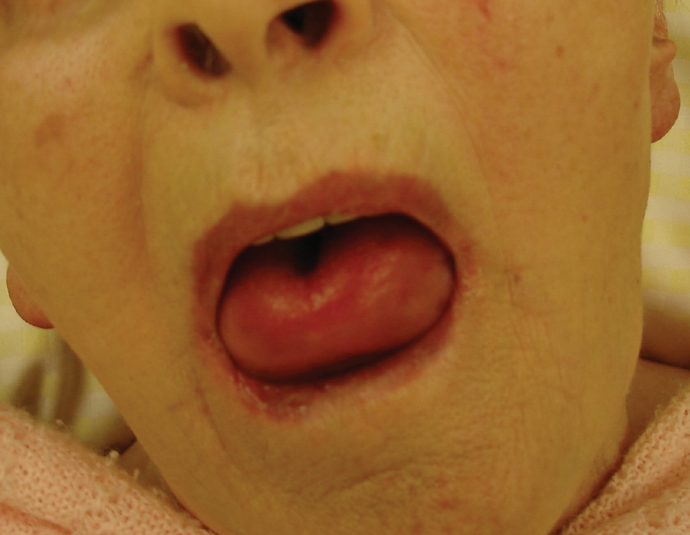An 86-year-old woman presented with acute, painless, nonpruritic tongue swelling (Figure 1) that had developed 6 hours earlier. She had no symptoms of upper airway obstruction or dyspnea, but her speech was dysarthric. The results of a physical examination were normal, and she had no urticaria. The patient was hypertensive, and she had been taking an angiotensin-converting enzyme (ACE) inhibitor (benazepril) for 12 years. We diagnosed ACE-inhibitor-induced angioedema and discontinued benazepril therapy. She was given intravenous steroids and antihistamines. There was no initial improvement, but within 2 days her tongue returned to normal size. The patient was given a different antihypertensive medication, and she remained symptom-free several months later.

Figure 1: An 86-year-old woman with acute, painless, nonpruritic tongue swelling.
Angioedema is acute, self-limited localized swelling of subcutaneous or mucosal tissue. It often affects the lips, eyelids, face, tongue, larynx or bowel, and often causes large, well-demarcated lesions that typically resolve in 2–3 days but may last 5–7 days. Angioedema affects 0.1%–0.5% of patients taking ACE inhibitors and may develop hours or years after therapy is initiated. Its onset may be idiopathic or the result of diverse causes such as nonsteroidal anti-inflammatory drugs, antibiotics, insect bites, food or environmental allergens and complement-inhibitor deficiencies. Cross reactivity with other types of ACE inhibitors is common, and a change of drug classes is necessary to prevent a recurrence. Treatments for angioedema are dependent on the underlying cause and may include antihistamines, corticosteroids, epinephrine and tranexamic acid.
Florim Cuculi MD Yves Suter MD Paul Erne MD Department of Cardiology Kantonsspital Luzern Switzerland
Footnotes
CMAJ invites contributions to Interesting images, a new column with a very brief but clear description of the case, the images and the main teaching point. Submit manuscripts online at http://mc.manuscriptcentral.com/cmaj.


